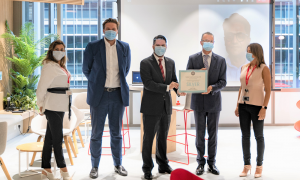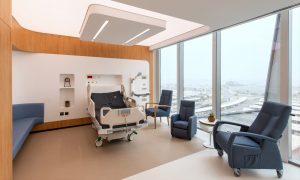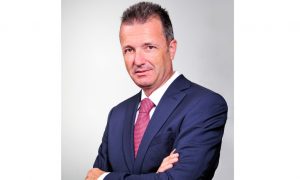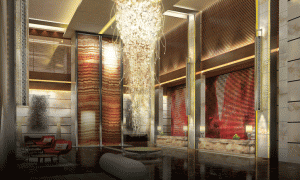In profile: Marcos Bish, Summertown Interiors
The managing director tells Big Project ME how he intends to keep the sun shining on Summertown Interiors, a Dubai-based specialist fit-out contractor
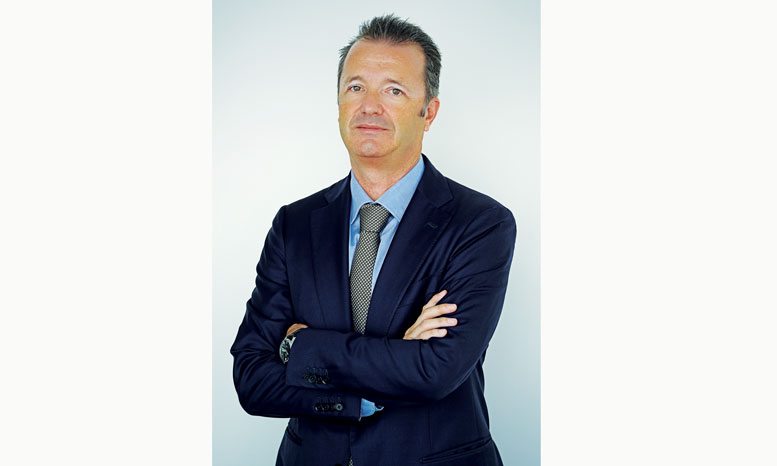
When people mention the term ‘contractor’, the mind is usually drawn to the massive organisations that conduct day-to-day on-site operations on a project – the main contractors who are tasked with overseeing the construction and handover of huge buildings or complexes. Alternatively, those of us who think more technically may consider a contractor to be a specialist in the MEP, groundworks or HVAC fields.
However, a crucial sector of the contracting industry is quite often overlooked, with specialist fit-out contractors considered something of an afterthought to the construction process. While designers and architects may get all the plaudits when interiors make the jaw drop, it is the fit-out contractor that makes it all come together, from a materials and installation point of view through to performance and operational efficiency.
Therefore, it makes sense that they be considered a crucial part of the process. After all, if the finishing and fit-out isn’t up to the mark, even the most impressively engineered project will struggle to attract the attention it deserves. To that end, Big Project ME decided to meet Marcos Bish, managing director of Summertown Interiors, at the contractor’s offices in Jebel Ali Free Zone, to understand what it takes for a fit-out contractor to thrive in a market that demands best performance while also maintaining tight margins.
“We set up Summertown Interiors in 1997. This year is our 20th anniversary and things have changed a lot since we first started,” says Bish, who is also a founding partner of the company. “We started initially as a joinery subcontractor and we had our own factory. Clients used to ask us if we could do a full project for them, but we resisted that for a while. But as a subcontractor you face different challenges, and eventually we decided to go ahead. We aligned ourselves with a business model and became a turnkey solutions provider.”
“Although we did well, the global financial crisis came in 2008 and that changed a lot of things. Because the market started to mature, we had to choose a colour, basically. We had to decide whether we were a design consultant, a fit-out contractor or a turnkey solutions provider. We decided that we were most comfortable as a fit-out contractor, so we left turnkey solutions behind and started to engage more with project managers, architects and designers.”
Going back to 2014/2015, Bish says the last few years have been difficult, with falling oil prices and increased maturity in the market making operations a challenge for the industry. However, he is quick to stress that he views these constraints as a good thing, pointing out that they will benefit the industry and economy in the long run.
“These have been difficult years, but we knew that 2014 and 2015 would be difficult. People then started to say that 2016 would be better, but the reality was that 2016 was not much different to 2015. Then they said that 2017 would better… so we just keep pushing forwards!” he laughs.
“However, for us at Summertown Interiors, 2017 has been exceptionally good, and I don’t think that’s because the market or industry has been good. I think it’s because we were prepared for the jobs being offered and I think we got a bit lucky, maybe. Regardless, we’ve had a very good start to the year.”
Having signed major contracts with Smart Dubai, Dubai Smart Government, TECOM and ACWA Power among many others in the first half of the year, it’s hard to dispute that claim. Bish is also quick to add that these clients are all new business, which come on top of repeat work from regular clients.
“As an organisation, we’re very much about environmentally friendly fit-outs, and we also work hard to be a sustainable business. I think these things combined, positioned as well with projects that we’ve won and executed – or are in the process of executing – have helped us have a good first half of the year. I think if we continue on this path, we’ll probably grow year-on-year by 30%.”
One thing Bish says has changed, and he links this back to the market maturing, is that there has been a huge increase in demand for sustainability. He estimates that around 65% of the contractor’s business today comes from environmentally friendly fit-out.
“In 2008, we executed this office [the Summertown Interiors main office in JAFZA] as LEED Gold. We were the first office within our industry to execute and operate a LEED Gold office. Then we saw that there was increased interest in the sustainability model. Today, we see that more and more of our clients are going down the route of sustainability. That can either be with certified interiors, meaning that they want green certification, or it could mean that while there’s no certification, they want to execute it in an environmentally friendly manner.”
With the UAE government embracing sustainability as part of its Vision 2020, 2030 and 2050 plans, he says it’s essential that contractors get on board with delivering sustainability.
“It’s all to do with Dubai wanting to become a top ten smart city in the world. By 2030, 50% of energy used should be from renewable energy. By 2050, it’ll be 75%. If you look at the vision of the UAE, it’s all in line with sustainability.”
Quite often, the argument against sustainability is that it costs too much. Bish doesn’t hold much truck with that.
“We see it as a misconception that it costs extra. It may take extra effort and focus, but we believe that if you want to execute a project in a green market then it shouldn’t cost a dirham extra, other than the certification process itself, which costs between $1,000 and $2,000 per project.
“It’s about how you design the project, how you plan it, how you execute it and how you document it. If you do all of that properly, from the front end and not as an afterthought, then it shouldn’t cost anything extra to do it,” he avows.
Working in a maturing market comes with its own distinct challenges, with clients focused on getting value for money. While Bish does not see a need for Summertown Interiors to get involved at the design stage, leaving that for the architects and designers, he says the company is involved in other ways.
“I don’t think we necessarily need to be involved in the design stage. We can leave that to the professionals, but of course we can assist designers when it comes to materials that we use, best practices and so on. If they want.
“What we do is run green workshops that people can attend for free. That way, we contribute towards the topic of sustainability. We take a leadership position where we can educate and speak to like-minded organisations, and learn from them. I like to think that we have some impact, but we don’t want to overstate that – at the end of the day, it starts with the client!
“However, I don’t think it’s very difficult because there’s an economic driver here. If all we do is talk about the environment – that we need to leave it better for our children and grandchildren – then I don’t think that’s going to necessarily motivate businesses to take that step.
“But if we talk about it from an economics perspective, about how it makes sense for an organisation to go down that route, [then I think we’ll have more success]. When we talk about the economics of sustainability, we’re talking about reduced operational costs, which is one way to look at it. The other way is to look at where it generates revenue for the organisation. Sustainable organisations are generally more productive and healthier [in terms of their employees],” he explains.
“If you’re a sustainable organisation, you tend to be able to attract younger and better talent. People are even willing to rejoin your company if they’ve left. So I think that sustainable organisations have a competitive advantage – not just economically, but also from an employee and marketing point of view,” Bish asserts.
Looking to the future, the introduction of VAT next year is likely to have a major impact on the construction industry, with the fit-out sector particularly affected, he predicts.
“In our opinion, VAT coming in next year will professionalise the industry. If you look at the UAE economy, then we know that 60% of the revenue generated is by SMEs. The majority of SMEs do not keep proper financial books, and even fewer do proper financial audits.
“When you’re going for VAT, then you’re going to have to have proper financial audits, so I think that once companies start looking into their financials, then they will be surprised. They will either become more efficient and effective to optimise their business, or they’ll simply go out of business,” he states bluntly.
“You need to be well prepared. Not just for VAT, but for the proper recording of transactions. Otherwise, you’ll become even less efficient as an organisation if you cannot process VAT claims. You run the risk of fines and penalties with the government, if you don’t properly report your finances. We see the introduction of VAT as something that will professionalise the market.”
Professionalism is something Marcos Bish insists on. Not only has he honed and shaped his company over the years to follow best practices, he sees it as an issue that the industry is grappling with.
“We embrace a maturing market as a fit-out contractor, because it makes for a more professional industry. We’ve seen that companies have had to scale down their operations or go out of business completely. Although we can argue about the quantity of business available, we see that we have less and less competition in the market – decent competition, that is!
“While there is competition in the market, when you have a serious client the competition suddenly thins out. [The maturity of the market] has professionalised the market and made sure that stronger, better and more efficient organisations survived. They are the ones that are here today.
“Although I will say that there are still too many contractors around. But I think that will change rapidly in the coming few years. I think we’re going to see, again, a cleaning of the market,” Bish asserts.
Summertown Interiors certainly intends to be there when this happens. Bish points out that the company has already begun investing in and focusing on key areas of the business to ensure that it is better positioned for the change that he thinks is coming.
“There are basically three things that we’re focusing on. Last year, we brought out our first sustainability report, and we’ll be bringing out our second this year. Sustainability is fundamental to the business and we’re trying to embed it in all the processes and practices within our organisation. We’re passionate about it, we’re good at it and it drives our economic engine. One of our goals is to be carbon neutral by 2020, which is a journey we started in 2009.
“The second thing that we’re focusing on, and it’s something we’ve identified as a growth sector for us, is the healthcare sector. If you look at the fit-out industry in general, we see that there are many projects in the retail, hospitality and education spaces. The industry remains flat at the moment, and we don’t expect it to pick up in the coming years. So, we’re looking at different sectors, one of which is the healthcare sector.”
Investment in that area is ongoing, Bish reveals, with Summertown employing people to map out a strategy for the company, allowing it to get a head start in gaining market intelligence and communicating with decision-makers in the healthcare industry. Although the company has some experience in the sector, he recognises that there is no clear leader in the healthcare fit-out market, and believes that the moment is right to seize the opportunity.
“This is an opportunity to become the leading specialist in the sector. We’re putting money, time, resources and effort behind it,” Bish asserts. “We chose healthcare rather than retail or hospitality because we think that the values we have as an organisation fit in well with the healthcare industry. We’re all about sustainability, functionality and quality – we believe that it’s a good fit for us.”
The third thing Summertown is focusing on is a global alliance that Bish believes will propel it to an entirely new level of business and operational performance. Similar to what airlines have done, the alliance – the United Workplace Group – will give participating companies a global footprint, he explains.
“We’re a UAE-based company, we’re not an international organisation. But by becoming part of a global alliance, we will be able to tap into the networks and organisations of other companies around the world. We can exchange leads, conduct referrals with each other and exchange ideas. We can share best practices with them, carry out employee exchange programmes and in that way, we can become more global through collaboration,” he outlines, adding that the alliance will be launched officially in September this year.
Finally, Bish outlines his vision for Summertown Interiors, telling Big Project ME that while others may want to go bigger, his intention is to make sure the company he started back in 1997 always goes better.
“We’re not looking to be the biggest contractor in the UAE, but we’re definitely looking to be the best and most sustainable. There are specific sectors where we want to be the specialist or go-to contractors – interior office fit-out and the healthcare sector.
“That’s generally it. We want to be a sustainable business, not just from a green point of view, but also one where we take good care of our employees, engage with the community at large, while also taking good care of our suppliers,” he concludes.
